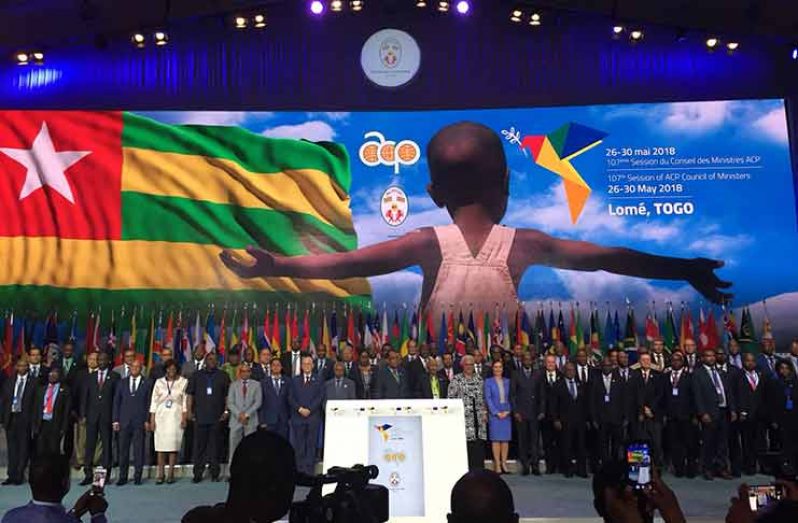– in search of Cotonou successor
AFRICAN, Caribbean and Pacific Group of States (ACP) members on Friday agreed to a draft negotiating mandate as a group, as well as to seek a legally-binding arrangement with the European Union (EU) that builds on the existing Cotonou Agreement which is set to expire in 2020.
The Cotonou Agreement is aimed at the reduction and eventual eradication of poverty while contributing to sustainable development, and to the gradual integration of ACP countries into the world economy. The Agreement also speaks to the fight against impunity and promotion of criminal justice through the International Criminal Court (ICC).
The new agreement is expected to take into account the issues of middle-income countries, small-island developing states (SIDS), least developed countries (LDCs) and landlocked developing countries (LLDCs). Guyana joined members of the ACP and the EU for the 43rd Session of the ACP-EU Joint Council to further discuss post-Cotonou negotiations. The meeting was held in Togo, West Africa.
In a statement to the media, the Ministry of Foreign Affairs said, subject Minister Carl Greenidge participated in talks focussed primarily on diversity, while exploring a number of areas, including a joint ACP-EU declaration on climate change and migration.
Greenidge, who has been appointed Deputy Chief Negotiator to the Central Negotiating Group (CNG), raised a number of issues of importance to the ACP. Those issues included the 15th Joint Ministerial Trade Committee meeting held in Brussels, Belgium last year, as well as the as the problems of middle-income states and instruments that would be of use to assist them.
With the Cotonou Agreement set to expire in 2020, the organisation is looking towards post-Cotonou negotiations, which will be led and guided by a CNG. Guyana and Jamaica will represent the Caribbean region on this body. Minister Greenidge first served as a member of the Negotiating Troika for Lomé III in 1983 when he was Guyana’s Finance Minister.
Meanwhile, earlier this week, the Foreign Affairs Minister led a team to Lomé, Togo, West Africa for the 107th Session of (ACP) Council of Ministers held from May 28 to 30. During that session, the ACP Group examined means of revitalising both the organisation as well as its relations with the EU.
In 1975, the Georgetown Agreement, aptly named for being signed in Guyana’s capital, gave birth to the ACP Group, which brought countries from three distinct regions together to focus on trade, cultural cooperation and socio-economic development among other common interests. Presently, the ACP Group is looking to amend the founding agreement to better equip the organszation to engage with other countries and bodies in the international arena. Concurrently, in 1975, the ACP entered into a trade and aid partnership with the EU under the Lomé Convention, which was replaced by the Cotonou Agreement in 2000.



.jpg)








